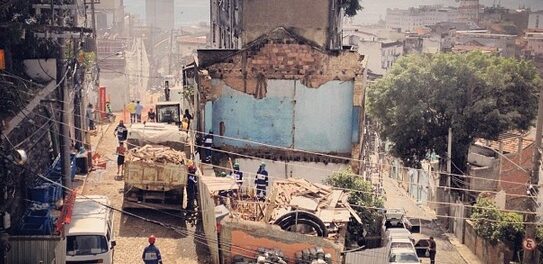
“I’ve not been respected at all,” exclaimed Providência resident Neuzimar in Monday’s court hearing with the State Public Defender’s office, Public Ministry, representatives from the City government and the Providência community’s residents commission regarding the public works currently underway in the community. She relayed how she’s been threatened with eviction and surrounding houses have been demolished, cutting off water and leaving her in a precarious living situation with her elderly mother.
Located in the heart of Rio’s Port area, Providência is undergoing major works as part of a larger regeneration of the region under the Olympic infrastructure public-private initiative Porto Maravilha and the municipal favela upgrading program Morar Carioca. Under current plans 30% of Latin America’s most historic favela is marked for eviction. Works and evictions have already started, however the various illegalities in the way these are being carried out led the State Public Defenders Office’s Land and Housing Nucleus, which legally represents the community, to officially file a request for the works to be stopped and investigated.
Technical studies and studies which assess the environmental and social impact of the works–which include a cable car station already under construction on the community’s main square–are required by law. However no such studies have been carried out.
While touched on at the hearing, the main grievance discussed was the complete lack of communication between city authorities and residents over the works. Residents often come home from work to find their house spraypainted with the initials of the Municipal Secretariat of Housing and a number. There is little or no access to information regarding the project and work plans. Beyond an initial presentation of the project, no public meetings have taken place. Also, while evictions are not strictly compulsory, the immediate demolition of vacated properties means those who choose to stay are left to live amongst rubble in often unbearable conditions.
As the judge, public defenders, public ministry and city government representatives sat around the table at the center, around twenty residents and supporters of the community packed around the edges of the room. The Public Ministry representative advising the judge on the case said: “We feel the community’s affliction. They’ve come here and want answers.”
No such answers were given on Monday. The case was adjourned while the Public Ministry representative and judge examine the extensive file. The Public Defenders expect a decision on whether the works will be halted by the end of the month.
In the hearing, indignation amongst residents was palpable. Speaking afterwards, lifelong resident and law student Cosme Felipe, 23, said: “I’m not against the works. I believe most residents aren’t against the works. We’re against the city authorities and the workers’ approach. The lack of information, the lack of consulting people that live there on how to do this, what to do, whether we want it… It’s not just information we want, we want interaction between the people and the secretariats of housing and works to know what’s happening and also make proposals.”
He went on: “They want us to leave. They say leaving isn’t compulsory but there are people living on an island surrounded by debris. The house in front has gone, the house next door has gone, there’s water leaking and rats and a load of things. All that is making it so the person gives up living there. You talk to workers from the city government and they say there isn’t a solution to this problem. It’s like they’re indirectly ordering you to get out… They’re not thinking about residents. They’re thinking about the works.”

